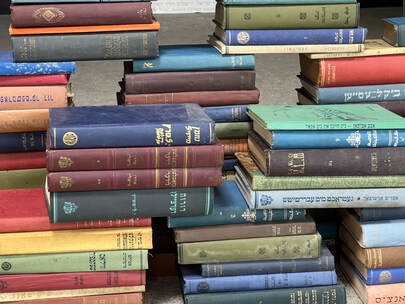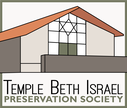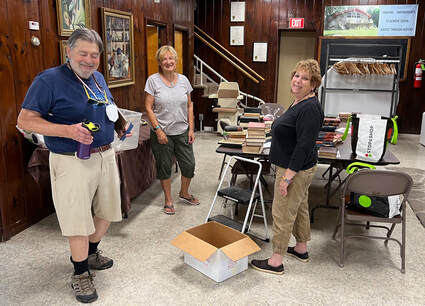 It was a project that we had put off for many years. Going through the books in the Temple Beth Israel “library.” This was a collection that was stored separately from the sacred texts, Khumashim, weekly and Sabbath prayerbooks, High Holiday Makhzors, etc. In August 2022, a group of us gathered to sort through the Temple’s library books. We stacked the books into categories - some for burial (prayer books that were no longer in use or falling apart), some English language books to be donated to a local used bookstore – and a collection of Yiddish books which we would donate to the National Yiddish Book Center in Amherst, MA and finally, books that were falling apart, or otherwise needed to be recycled or retired. We decided to keep a sampling of books in each category as examples of the library’s contents. As we handled the books which were arrayed on a number of tables, we realized that we were handling artifacts from what had been an active lending library – a collection of books ranging from the socially radical secular to the highly observant religious and everything in between. We had before us a portal, a lense through which to get a glimpse of the community in the 1950s and 1960 when we were in middle and high school. In those years, for many of us, our parents and their connection to the Temple carried a complex aura of mystery, history, and loss. These books provided a clue to the social and cultural makeup of their interactions. We also came upon a small wooden box containing hundreds of index cards on which were typed the English titles (approximately 100) and an estimated 100 Yiddish titles that were handwritten in Yiddish script. There were also a handful of pink cards indicating who from the community had borrowed certain titles and on which dates. Scanning the titles, we could get a sense for the diversity of the community. There were books on history, philosophy, childrearing, manners, citizenship, politics, Israel, and everything in between. We fondly pictured our parents and tried to imagine which of them had donated which titles. We thought further about which titles may have appealed to them. I remember my mother reading “a book” from this library but I don’t recall asking her what it was. She would simply tell me “it is very interesting.” This often meant that she had never encountered the subject matter before. This from a woman with a fourth grade Polish schools education, a night school introduction to English and beyond that, self taught. We knew the members of the community well enough to imagine who had either donated or borrowed which titles according to their interests and skills. There were books of essays, books on citizenship, plays and novels. Books for scholars, the very religious, skeptics, atheists, good citizens, farmers, etc. There was a history of the Workmen’s Circle, Ben Gurion’s Rebirth and Destiny of Israel, a Book of Torah Readings, and Tennyson’s Early Sonnets. We also found dozens of childrens’ books, Hebrew alphabet books, children’s bible stories and classroom workbooks. The library featured books that would have been popular in the 40’s through the late 50s. There was a copy of The Intelligent Woman's Guide to Socialism and Capitalism, a non-fiction book written by the Irish playwright George Bernard Shaw. The book was written in 1928 after his sister-in-law, Mary Stewart Cholmondeley, asked him to write a pamphlet explaining Socialism. Shaw examines various socialist ideas, including the issue of private property under socialism, population control, the difficulty of creating non-market-based means to ascribe value to human activities and the problem of wealth distribution. He explores Marxist concepts such as surplus value along with the ideas of non-Marxist socialist thinkers such as Henry George. Some more titles: Craine, Children of the Rising Sun, Soloff, How the Jewish People Grew Up, Lucretius, On the Nature of Things, Thomas Paine, Common Sense and the Crisis, Sholom Aleichem, Tevye’s Daughters, Milton, Paradise Lost and Other Poems, Robert Browning, Selected Poems, Fitzgerald, The Rubaiyat of Omar Khayyam, Henry Esmond, Thackery, Erasmus, The Praise of Folly, Horace, Selected Poems, Gibbon, The Decline and Fall of the roman Empire, Anatole France, The Revolt of the Angels, Dallin, Sketches of Great Painters, Aristotle, Politics and Poetics, Epictitus, Discourses, Liebman, Peace of Mind, Heinrich Heine, The English Legend of Liptzin, Milton Cross, Encyclopedia of the Great Composers and their Music, Learsi, Israel – A History of the Jewish People, Ribalow, The Jew in American Sports, I.L. Peretz, The Book of Fire, Samuel, The Gentleman and the Jew, Shulman, What It Means to be a Jew... |
© All Rights Reserved - Temple Beth Israel Preservation Society 2024


 RSS Feed
RSS Feed